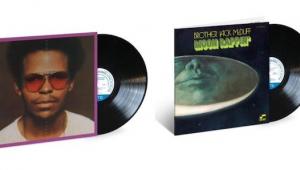I am glad to hear that they are switching from 200gm to 180gm but the reasons they give are not the whole story. 20gm of saving on vinyl times hundreds of thousands of records comes to a pretty substantial cost saving, as any process improvement engineer will tell you. Further, QRP's record (from what I have heard, and experienced) is not good with 200gm records. This was merely a marketing gimmick to justify higher record prices and to distinguish 45rpm records from 33s (they also pressed some 33s at 200gm). IN my opinion, and I could be totally wrong, the 200gm record also affects the angle of the stylus a bit as it is fatter. Anyways, kudos to Chad for putting a great marketing spin on this change. Now, if they would only reduce the price a bit and pass some of the savings (which they do not acknowledge) to us, the Customers!
Quality Record Pressings Sheds 20 Grams

I’ve been saying for decades “They just have to hear it”. Now they are, and they like what they are hearing. Sales are soaring of what were once considered “pricey” high quality “catalog” records from Blue Note’s “Tone Poet” series to Analogue Productions’ “doesn’t everyone already own that?” offerings like Brubeck’s Time Out.
Older enthusiasts may already own chestnuts like Tea For the Tillerman, Getz/Gilberto (from the new Verve series) and the like, but now the youngsters want them too.
According to QRP’s Chad Kassem, it’s getting more and more difficult to keep up with the demand for Analogue Productions’ back catalog while trying to fulfill outside orders for other titles both old and new.
For instance, QRP has for years been pressing Beatles records for UMe. The numbers are confidential but even the most diehard vinyl enthusiast would probably react with disbelieve had we permission to divulge them.
In order to increase pressing efficiency without sacrificing quality, QRP has decided to shed some weight. Instead of pressing 200 gram records the plant will transition to 180 gram records that will retain the plant’s “flat profile with groove guard” feature.
Kassem says its far easier to press consistently excellent 180 gram records and that it’s not likely anyone will hear a difference other than that outer groove areas will be uniformly more quiet (getting the warm vinyl to evenly flow to the outer edges of the stamper is far easier at 180 grams).
This move is not about saving money since the cost of 20 grams of pellets is negligible. It’s all about increasing efficiency and reducing pressing backlogs for both Analogue Productions’ releases and those of outside clients who appreciate QRP’s quality.
Kassem added that the 180g change would not effect 200 gram flat profile Clarity Vinyl hand-pressed UHQR records.
- Log in or register to post comments


If Kassem is admitting that QC is easier at 180g, then something I've believed was always a problem with 200g pressing. Two other companies tried 200g. These were MoFi and Classic Records, both went out business shortly after the change to that thickness. This probably didn't cause MoFi's bankruptcy because they weren't pressing records by the time they filed with the courts. The were only selling Gold CDs. But I don't remember a lot of people liking many of the Anadisq 200 records when they were being made. What I do remember is a lot of complaints about Classic's release on 200g SV-P records when there weren't any with same release on 180g. I know a lot of people requested replacement record on 200g. If this were the case, then they probably didn't get the margins they were expecting. I think AP is in a better position because they own their own pressing plant. And I think it's wise to listen to the QRP staff, instead of trying to make 200g work. I don't think this happened at MoFi or Classic.

If 200gm pressings are inferior sounding compared to 180gm pressings, why continue to press Clarity Vinyl hand-pressed UHQR records on 200gm Vinyl. I would think they should press those on 180gm also, giving us the best sound. And having only one weight records will lower their production costs, and possibly lower the selling prices.

"Don’t let the 180 Gram sticker alone put you off buying a great LP… but also, don’t let it alone be the major deciding factor when buying a record. It’s not magic, but it’s not to be dismissed as “gimmick” because there are in fact many benefits to heavyweight vinyl pressings when that is part of a bigger picture of quality production that includes quality mastering from the best sources to achieve a result that is a better product in all areas."
140 gram is fine.

Oscar Peterson Acoustic Sounds release weighed in at 168g (mine did anyway). So, I presume that they started this policy already?

on this and on other forums that that particular record seemed a little flimsy compared with standard Analogue Productions releases. I nerded out and weighed a number of recent “180g” releases. Most weighed more than 180g. I don’t think that the weight makes the blindest bit of difference to the sound: however the Verve releases are premium priced. There is a big difference in the feel of a 200g vs 168g record. Presumably that is why AP are releasing their UHQ albums at 200g.

Back in my marketing days we had a contract on a plastic (fiberglass reinforced) part that was over 16" long and the "specification" was the plastic raw material had to be in "puck form" and centered in the heated press.
Those pressed parts were less strong at the ends and the material had a hard time working its way to the end of the part and thus had shorter time in the press . The overall cycle-time was critical.
We found away around the problem by using shredded material measured to the same weight and sprinkled end to end and all the material had to do was come vertically in a half circle up the sides of the part. The part was 4 times stronger in the middle and 10 times stronger at the ends.
It may be that having a lp puck the same weight but twice the diameter so the flow to the lead in groove was closer/faster and was being heated as long as the inner part of the lp.
I'm sure that the great folks at QRP have looked at many ways to make the LPs the best they can be. I am sure that moving the vibrating hydraulics off the press frame was a Big Deal.

I have no idea what the sound differences are among 140g/180g/200g. I think to do a real comparison I’d need otherwise identical records of the three weights and I don’t see how I’d pull that off.

The vinyl renaissance, that is. The kids are alright!

Hey!
Great! So I won't have to readjust the VTA every time I play 200gm disc and back again... just kidding. Really I'm fine with 180gm.
You know, they should make their special UHQR as thick as the Edison Diamond Disc.

Higer reject rates at the plant means higher chances that borderline quality gets into consumer's hands. Take a Tone Poet 180g pressing. About as good as it gets in my opinion.

I’ve got no problem whatsoever with Chad choosing to “trim off” 20 grams per record, especially because those grams are gonna add up rather quickly and can be obviously used towards other records. When QRP was a rather new pressing plant, I immediately noticed the high quality of the records done there, and started seeking QRP pressed vinyl out. I actually sent Chad an email thanking him for his efforts. He responded to me, and said that he’d sent my thank you letter to all of the staff at QRP, which I felt very fortunate and happy to hear.

A 140g can sound far superior to a 180g record.

From MusicMatters website, been there for years:
https://www.musicmattersjazz.com/the-sound-s/45.htm
We use 180 gram pressings for the simple reason that we believe 180 gram weight is more than sufficient to provide a near perfect pressing. Forcing presses that were designed for 150 gram and 180 gram weight to press 200 gram vinyl results in a multitude of additional problems including warpage. A check of audiophile vinyl chat rooms reveals many dissatisfied buyers of 200 gram vinyl. When Music Matters asked our friends at Record Technology Inc. for their recommendation to achieve the highest possible quality pressings their answer was unequivocal......
go with 180 gram!

I'm no expert, but I have gotten a number of warped new pressings in the last few years. I'm not sure who pressed them, but it seems to be a bigger problem with heavier weight vinyl. Maybe because they take longer to cool? In the golden age of vinyl you would hardly ever see a new warped record. These days it's all too common (even with some 45's, like the Beatles singles box last year).

Therefore, I think going down to 180g is an improvement. It also will make the records 10% lighter to move!

It's always about money, whether it was the decision to make 200g to charge more than 180g....Or now trying to cover up the fact that 200g is too expensive and they are not making enough money on it because the quality is not all that as people have been complaining about on music/audiophile forums.
Long live 180g records and thank God we have Optimal Media GmbH.



















































